Sukhoi-30MKI fighters will be based in Thanjavur.
Tejas Mark 1 aircraft will be based in Sulur.
The Rafale squadron will be based in Ambala.
Ajai Shukla reports.
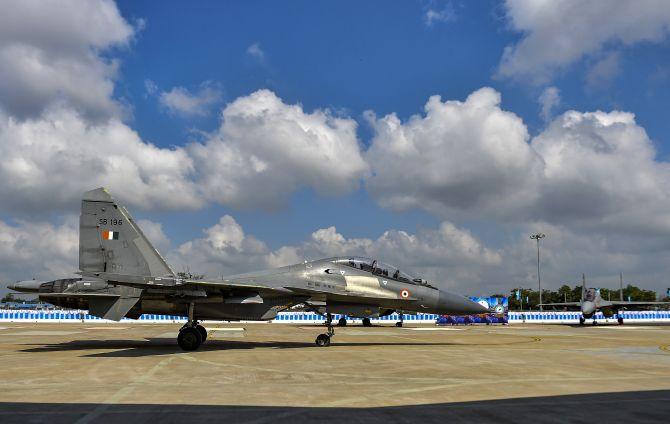
There is finally light at the end of the tunnel for the Indian Air Force, which is at its lowest point since the 1970s with just 28 fighter squadrons operational as against the authorised 42.
A senior IAF planner says the squadron strength would not fall any lower. Starting from 2020, numbers will gradually rise.
Three squadrons will be inducted this year while only two squadrons will be withdrawn from operational service.
One new squadron, raised in Thanjavur, Tamil Nadu, will be equipped with new Sukhoi-30MKI fighters, built by Hindustan Aeronautics in Nashik. These fighters will mount the air-launched version of the BrahMos cruise missile, and will be earmarked to carry out maritime strikes against enemy warships in the Bay of Bengal, Arabian Sea, and Indian Ocean.
In addition, the second squadron of Tejas Mark 1 light combat aircraft will be raised in April. The first squadron of Tejas Mark 1 -- Number 45 Squadron, called the Winged Daggers -- is already operational in Sulur, Tamil Nadu. Now the second will begin receiving its fighters from HAL.
The third squadron to be raised this year will be equipped with the Rafale.
Slated to be based in Ambala, Number 17 squadron will received its first batch of fighters in India by May and is likely to achieve full strength by March 2021.
Meanwhile, on the negative side, the IAF's last MiG-27 squadron was phased out of service in December; and another MiG-21 squadron is currently being retired.
With HAL Nashik likely to complete the delivery of all 222 Sukhoi-30MKI contracted by the IAF in the coming year, the IAF is processing an order for 12 more fighters, to replace the fighters lost over the years in accidents.
In addition, a significant number of Sukhoi-30MKIs have begun coming up for overhaul each year, in HAL Nashik. The additional fighters now being ordered will function as 'replacement fighters' for the ones being overhauled.
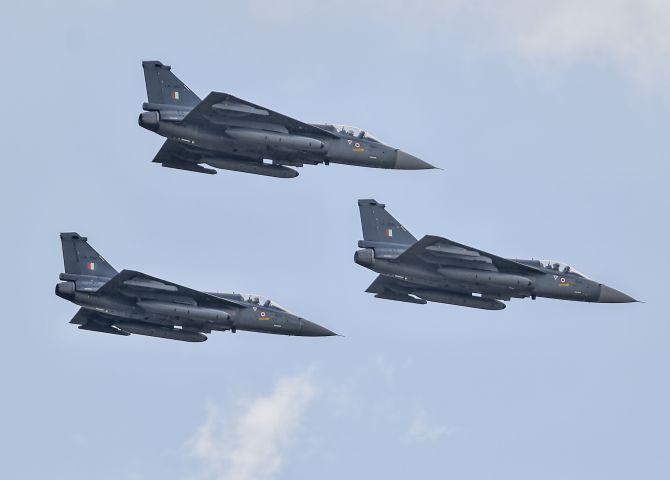
Also in the pipeline is a squadron of MiG-29 fighters that Russia has offered India.
The IAF is going ahead with the procurement, but officials say the fighters would first have to be fitted out with new avionics and weaponry. This is likely to take two to three years.
There is also a global procurement under way for 114 medium fighters.
However, this is at a preliminary stage and, given the budgetary constraints, the IAF is not banking on these aircraft joining the fleet any time soon.
In the medium term, the IAF is looking to the Tejas Mark 1A to stabilise, and then raise its squadron numbers. A contract for 83 Tejas Mark 1A will be signed by April which will add up to four squadrons.
The senior official says the IAF has stressed to HAL that it must reach its planned production level of 16 fighters per year. An investment of Rs 1,200 crore (Rs 12 billion) has been made to expand HAL's production capacity.
At present, the IAF's fleet includes 12 Sukhoi-30MKI squadrons, three MiG-29UPG squadrons, six Jaguar squadrons, three Mirage 2000 squadrons, one Tejas squadron, and the last three MiG-21 squadrons.


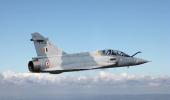

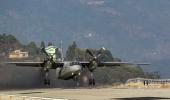




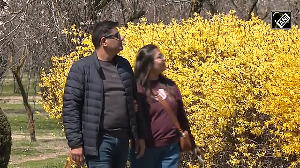


 © 2025
© 2025